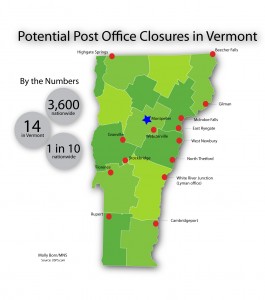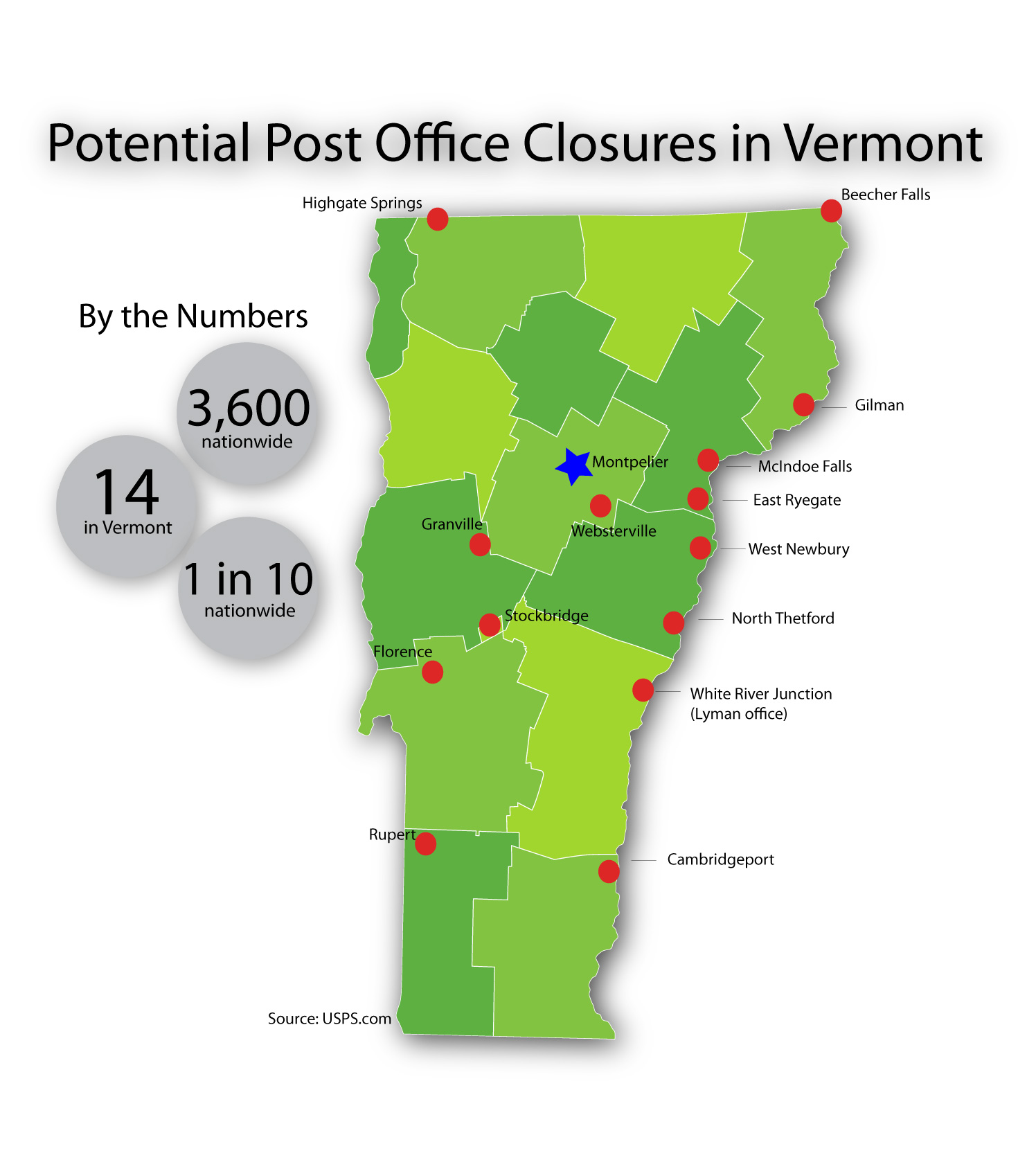WASHINGTON—As the so-called “heart and soul” of rural America, the Postal Service has put many small towns on the map. But this classic part of the American identity is still struggling to find its own.
 When the Postal Service announced recently that more than 3,600 low-activity retail post office locations could shutter next year, questions surfaced about what a post office means to a community and what our Founding Fathers had in mind when they established the nationwide system of mail delivery that today moves 40 percent of the world’s mail.
When the Postal Service announced recently that more than 3,600 low-activity retail post office locations could shutter next year, questions surfaced about what a post office means to a community and what our Founding Fathers had in mind when they established the nationwide system of mail delivery that today moves 40 percent of the world’s mail.
What does the law say?
Following the agency’s announcement, three Vermont lawmakers sent a letter to the Postal Regulatory Commission decrying the potential closures. The letter suggests shuttering rural locations is unlawful, citing Title 39 of the U.S. Code. Enacted in 1960 and revised a decade later, Title 39 defines the agency’s responsibilities.
“The Postal Service shall provide a maximum degree of effective and regular postal services to rural areas, communities, and small towns where post offices are not self-sustaining. No small post office shall be closed solely for operating at a deficit, it being the specific intent of the Congress that effective postal services be insured to residents of both urban and rural communities,” the code says.
Peter R. Teachout, an expert in constitutional law at Vermont Law School, called that “pretty powerful stuff.”
“That sounds like something that might have traction if a lawsuit were to be brought challenging the closure,” he said. “That’s got real legal teeth.”
Christine Pommerening, a research assistant at George Mason University who specializes in organizational structure, said the Postal Service has been hamstrung by Title 39’s poorly defined responsibilities. “The language is so vague you have to really wonder, ‘What does it bind us to?’”
There’s little to point to in America’s doctrines. While developing a national system of mail delivery was paramount for our Founding Fathers, even then, the rules were nebulous. The Constitution gives power “to establish Post Offices and post roads,” defined as a road over which mail is carried. The imprecise definition of “post roads” led to one of Supreme Court Chief Justice John Marshall’s early landmark decisions, which ruled in favor of creating the Pony Express. He cited implied powers allowed for its formation, Teachout said.
“The Constitution really provides no further direction as to how that power will be exercised,” Teachout said.
What were our Founding Fathers thinking?
When the country was founded, the cabinet-level Post Office Department was considered a revenue-generating branch of the government, said Columbia School of Journalism historian Richard R. John. By 1800, it was replaced by the idea that the Postal Service should break even, to put a limit to the services the agency could provide.
From about 1851 to 1970, the Postal Office Department often ran a deficit. When it occasionally ran a surplus, service and facilities were expanded and rates were lowered.
“Postal administrators, they’re not like Apple, where they’re building up this huge war chest,” John said. “They don’t get to keep their own surplus.”
Meanwhile, while acting as the country’s biggest employer, the agency was also mired in politics. Until 1970, the Postmaster General had customarily been part of the president’s cabinet. The agency was filled with campaign workers from the winning party. With every election cycle, there were postal employees.
As a result, consulting firms said the agency should operate like a corporation. So, the Postal Reorganization Act of 1970, which created the Postal Regulatory Commission, was established as the independent agency that stands today.
And that’s been the challenge ever since, John said. The Postal Service, which has a monopoly on all U.S. mail delivery, is still embedded in Congress and the commission.
The Postal Service lost $8.5 billion last year. The unprecedented loss prompted several lawmakers to introduce plans to reform the agency. One dramatic solution calls for government oversight of the Postal Service budget if the agency defaults on its government obligations for more than 30 days.
“It’s been a remarkably well-run, effective communication media for over 200 years, and I don’t see why we should dismantle it,” John said. “But if they continue to lose $5 to 6 billion a year, they have a problem.”
Connecting a nation?
Title 39 also states that “The Postal Service shall have as its basic function the obligation to provide postal services to bind the Nation together through the personal, educational, literary and business correspondence of the people.”
But about 90 percent of mail volume today is advertisements and magazines, and the Postal Service’s function as a means of two-way communication is outmoded, said A. Lee Fritschler, George Mason professor and former chairman of the U.S. Postal Rate Commission under President Jimmy Carter.
“Why should the government be subsidizing an operation that primarily delivers advertising mail?” he said. “It’s not a communications organization anymore. It’s a broadcasting organization, it’s one way.
It’s an addition to the discourse about the Postal Service that Fritschler said isn’t discussed enough.
John agreed. “I don’t think that the institution is sustainable on the long term if it’s seen as a boondoggle for junk mailers,” he said.
‘Heart and soul’ of the town
Another concern of Vermont lawmakers is the affect shuttered post offices could have on residents.
“Many of these post offices have been in continuous operation for over 100 years and are an essential part of the fabric of Vermont’s rural landscape,” the letter said. “We have heard from residents across our state concerned about the loss of their Post Office and the harm it will have on their community.”
But as technology has trumped old forms of communication, are post offices still the de facto village square?
John said there’s no question a town’s identity is largely dependent on a post office—even if residents don’t visit their post office on a regular basis.
“If the small-town post office is closed, I think it can destroy dozens, hundreds of American communities,” John said. “It has moored American identity for over two centuries.”
Postal offices do somewhat bind a community, Pommerening said. But “Is that sill an up-to-date picture of how people communicate and how people interact?”

